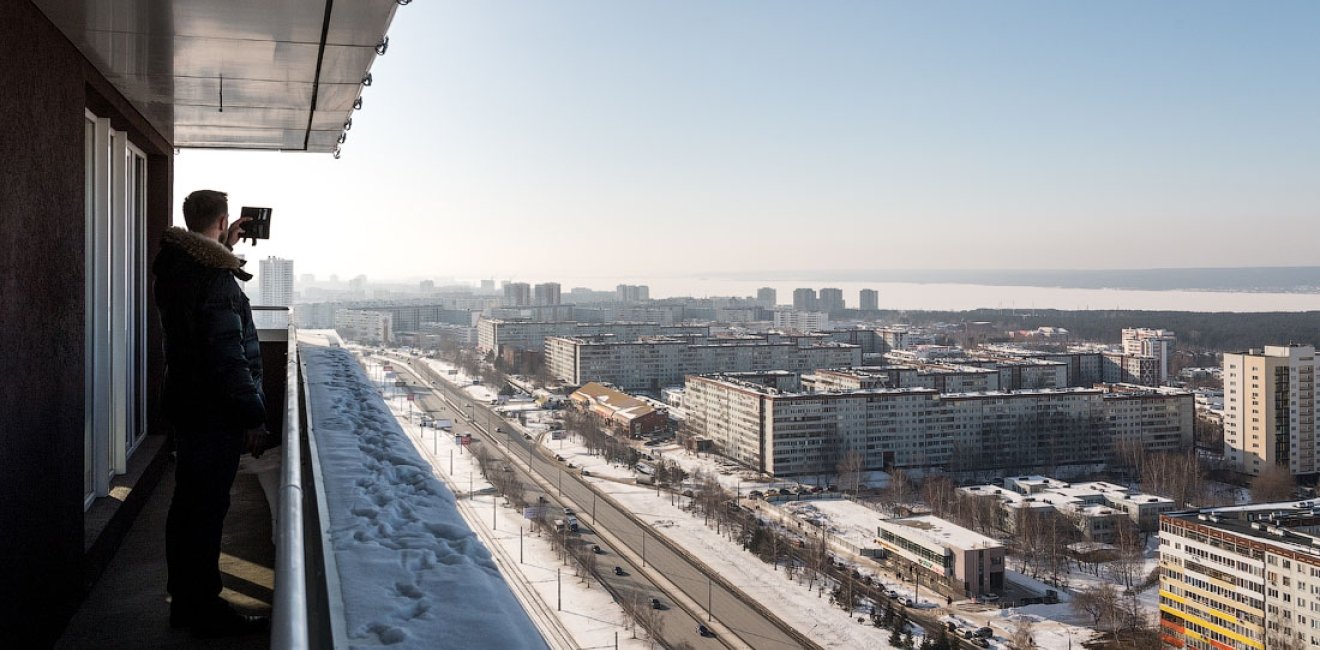
A blog of the Kennan Institute
BY NIKOLAY EPPLEE
The New Year’s holidays are one of the few times in the year that different generations of Russian families can be counted on to sit down together at the dinner table, and perhaps to watch TV after. During the first half of January, when most Russians do not work, people whose lives are normally conducted in separate spheres and who subscribe to different beliefs about Russian and Soviet history are brought into contact with one another. As conversations turn to an often emotion-laden exchange of views, the opportunity is at hand to evaluate and reconsider family and national memory.
At least since the start of the new millennium and President Vladimir Putin’s ascent to power, official national memory policy has settled on a narrative emphasizing Soviet-Russian continuity. The solidity of this connection is deemed a key pillar of national stability and is promulgated by authorities to foster a sense of national unity. But with recent attacks on the alleged seamlessness of such a history, the narrative is fraying. And much of the questioning and testing of alleged Soviet-Russian historical continuity is emerging in highly personal moments, in family conversations at the holiday table or in posts to social media. This questioning has led to a reevaluation of national history and, less expected, to a refreshing of Soviet-era cultural idioms and their assimilation into modern expressions. This complex, multiphasic reassessment of the national memory stock can be gotten at initially through a consideration of the shared experience of watching old socialist realism films.
Among the traditions of the New Year’s Eve day family celebration—besides the champagne toasts, accompanied by the Kremlin clock chimes marking the start of the holiday and the traditional Olivier salad—is watching together a set of classic Soviet movies. Stories of love and heroism dominate, their characters held up as models for the new society. Some years ago, however, discussions on Russian social media began openly criticizing the content of such films. Many viewers were surprised to learn that the timeless characters familiar from their childhood were in fact the product of Soviet realism, that the portrayals of love and heroism bore obvious indicia of codependency, oppression, infantilism, and sexism in human relations. The Soviet cultural canon, once close and familiar, began to be perceived as distant, no longer part of a viewer’s own life, and therefore accessible for criticism. “Soviet princes turned out to be complete frogs, and the entirety of the good old life suddenly appeared to be not good at all but poor, cramped and onerous,” Yekaterina Schulmann, a renowned political commentator, wrote at the time.
Time moves on, and, though it sometimes seems to go backward in Russia, this year the leaf appears to have turned over once more. People in their thirties who had previously diligently kept their distance from the traditional New Year’s customs now write on their social media pages that they’ve watched “The Irony of Fate” by Eldar Ryazanov (the Soviet analogue of Frank Capra’s “It's a Wonderful Life”) for the first time with their parents or had their first bite of Olivier salad—and liked it!
These personal moments have acquired enough density to form a cultural trend. As an example, this year the “Little Blue Light” program, the most viewed TV show on New Year’s Eve and another legacy of the Soviet era, took on a strange new cast. Soviet and early post-Soviet musical hits were performed, with a slightly ironical overlay, by the culture heroes of the new generation, YouTube and Instagram stars, who normally do not intersect with either the state-run TV or its audience. In Soviet days the show would be followed by a speech by the secretary general of the Communist Party, and the modern-day Kremlin has leaned heavily on the program as an example of the unbreachable continuity of Soviet and Russian history. A return to older material by contemporary artists and its recontextualizing for modern audiences marks a significant revaluation and reuse of the past, part of a much larger trend in taking stock of the national memory inventory.
Music too is exhibiting a massive paradigm shift. If in the last two or three decades Russian musicians tried to incorporate Western musical standards to escape a cultural ghetto and become part of the global cultural mainstream, now the situation has changed. As the music journalist Aleksandr Gorbachev wrote at the start of 2019, the younger generation is much more interested in working with local material and in referencing Russian (and occasionally Soviet) but not Western cultural heroes.
The phenomenon of reviewing and refreshing the national memory inventory is not limited to the arts but is broadly noticeable across Russian life. A revisioning of Russia’s built environment, dominated by Soviet-era prefab apartment blocks, is garnering headlines. “The message of the 2000s was: apartment blocks are terrible,” the journalist Yuri Saprykin wrote in a recent article. “Let’s destroy them and build new blocks designed by Herzog & de Meuron. Apartment blocks are something that should be overcome.... The message of the next generation is different: oh, cool, apartment blocks! They are charming in their brutality, they are tough, there is a lot of drama and poetry in them, it’s our memory, we’re made from that—these apartment blocks are worthy of being perceived as part of our identity. Their special beauty emerges through heaviness, tragedy, trauma, through the lack of comfort and normality which are innate in this place. And just because of all of this this place is worth … let’s not shy away from this word, love.”
Educational projects similarly have exhibited an interest in exploring and accepting the past. Perhaps the most interesting such projects to draw attention in the past year are the Arzamas.academy and the Polka.academy. Arzamas was founded in 2015 by Filipp Dzyadko, the former editor of Moscow’s version of the late Village Voice. It is an online platform dedicated to fighting the politicization of Russia’s history and promoting a cultural interest in the past. One way it fights against abuses of history is by showcasing classic Soviet movies and accompanying them with informed commentary. Polka is the online project of Yuri Saprykin, a popular lifestyle writer and one of the founders of Afisha, Russia’s answer to Time Out. Polka is reexamining the Russian literary canon by publishing modern and accessible literary criticism and shifting the focus from the golden age of the early nineteenth century to the less explored second half of the nineteenth century and the Soviet period. Through retrieving less illustrious works and placing them beside memorable classics, Polka tries to make available to readers a more honest accounting of the scope of Russia’s literary past.
The paradigm shift from rejection of the Soviet past to cautious acceptance to refreshing its cultural expressions for modern consumption has happened extraordinarily quickly. Such acceptance by no means indicates agreement with the precepts of socialist realism or of Soviet doctrine. But it seems a logical way to lay bare the past and achieve some reconciliation with it. As a tool, it is available across disciplines and demographic units, from families to administrative organs, as the examples offered above underscore.
Soviet past with which Russians are cautiously coming to terms is far darker and more insidious than iconic markers such as festive salads, romantic movies, and nostalgia-drenched apartment blocks would suggest. It is also a “difficult past” of state-sponsored terrorism against citizens and contempt for human life. In post-totalitarian countries, the process of reconciliation requires facing hard facts about the past as an early step in coming to terms with it. But to receive the truth, it is first necessary to stop denying it, and in a country seemingly bent on valorizing its worst era in modern history, it may be up to individuals to launch their own truth and reconciliation process.
In accounting, the process of inventory reconciliation entails matching the stock records with what is physically present in inventory. It is a useful metaphor for the kind of revaluing and reconsideration of the Soviet past that is going on now. In practice, the reconsideration of family and national history stands as a strong antidote to the Kremlin’s desire to enforce a view of recent Russian history as a modernized extension of the Soviet project. In conversations small and large, Russians today are reappropriating their past, revaluing it, and, where appropriate, celebrating it.
Author


Kennan Institute
The Kennan Institute is the premier US center for advanced research on Eurasia and the oldest and largest regional program at the Woodrow Wilson International Center for Scholars. The Kennan Institute is committed to improving American understanding of Russia, Ukraine, Central Asia, the South Caucasus, and the surrounding region through research and exchange. Read more

Explore More in The Russia File
Browse The Russia File
Chechnya as a Model of Modern Russia

Russia’s Indigenous Communities and the War in Ukraine

Gas and Power in a Changing US–Russia Relationship

